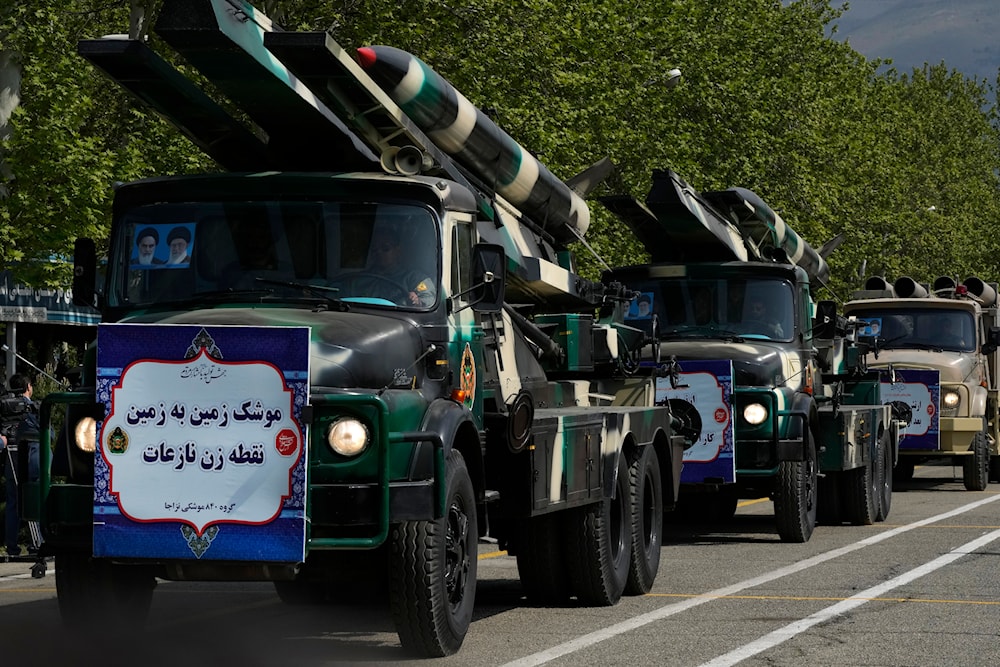'Operation True Promise' impacts regional order: Bloomberg
Iran's retaliatory attack on the Israeli occupation tests the limit of US-backed Israeli air defense systems, Bloomberg said earlier.
-

Missiles are carried on trucks during the Army Day parade at a military base in northern Tehran, Iran, Wednesday, April 17, 2024. (AP)
An article by Bloomberg addresses Iran's retaliatory attack on "Israel", highlighting how it launched one of the largest ballistic missiles in history.
It emphasized that Iran’s missile barrage has hit its target which, according to Bloomberg, is the "regional order."
Bloomberg also said today's Middle East is one revealed by October 7 and its aftermath, adding that a long, tense, and sometimes brutal conflict will take over the region.
On April 14, Bloomberg also talked about how Iran's retaliatory attack on the Israeli occupation tests the limit of US-backed Israeli air defense systems.
Israeli media admitted the loss
In a similar context, Israeli Channel 13 also shed light on the impact of Iran's retaliatory attack as it said that no country in the world has ever launched such a major ballistic missile wide-scaled attack on "Israel" before emphasizing that this is "bigger than Israel."
Following the Iranian response, Israeli media said that the latter constitutes a heavy and unprecedented public insult to "Israel" stressing that the Iranian warnings should be taken seriously.
Israeli media also said that Iran achieved a deterrence against "Israel" as it will have to think twice about how to react, highlighting that Iran conveyed boldness, firepower, and practicality through its operation.
Israeli hands are tied, no good option regarding Iran: Financial Times
A report on the Financial Times by a writer who is a senior counselor at Centerview Partners, president emeritus of the Council on Foreign Relations, and a former US diplomat discussed on April 16 why "Israel" has no good choices regarding Iran.
The writer, Richard Haass, said that Iran's retaliatory attack on "Israel" on April 14 is the first one carried out by Iran directly claiming that previously its war against the occupation was happening only in the shadows.
According to Haass, the big question is where "Israel" and the Middle East go from here as he believes that Iran wishes for things to go back to the way they were, which he claims is through an indirect war through "proxies."
Haass believes that the options available for "Israel" are to do nothing, go back to the status quo of waging an indirect war against Iran, initiate a limited strike against "military targets inside Iran" linked to the attack, or launch a large reprisal, which would include attacking Iranian nuclear sites.
He added that going for the first and second options has its advantages and it will give "Israel" more space to "focus on Gaza" and try to get back its captives simultaneously avoiding a wider war bearing deep economic, military, and human costs. This, according to Haass, will also please the Americans and dodge actions that would further "normalize homeland on-homeland attacks."
Haass ended his report by emphasizing that no matter what "Israel" does next, with the exception of changing the regime in Tehran which is beyond its capabilities or the West's, "there is no way to solve the strategic challenge" Iran poses. He added that at best, "the threat" could be managed but it is up to "Israel" to figure out how to do this best.

 3 Min Read
3 Min Read










